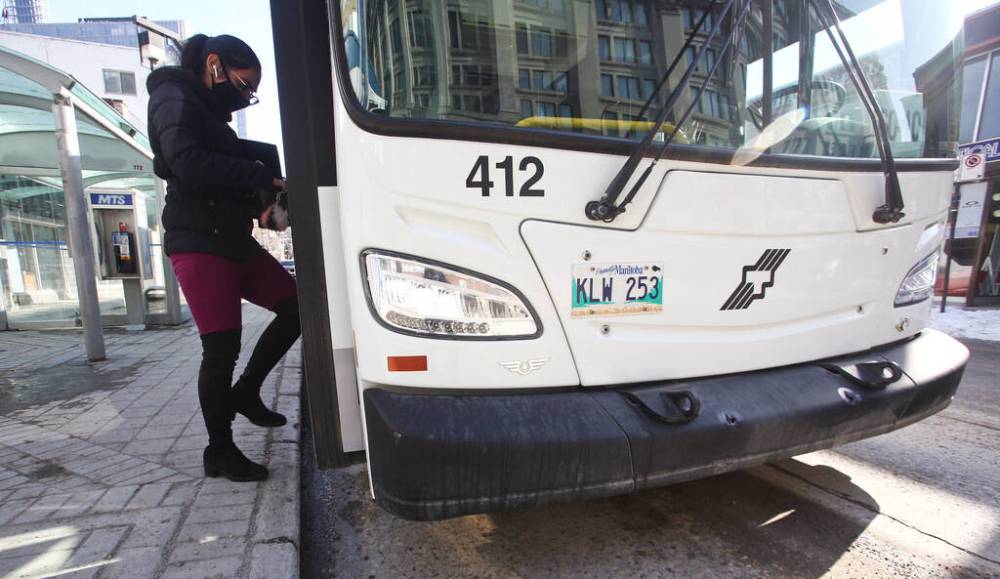Security force added fuel for Transit safety discussions
Advertisement
Read this article for free:
or
Already have an account? Log in here »
To continue reading, please subscribe:
Monthly Digital Subscription
$0 for the first 4 weeks*
- Enjoy unlimited reading on winnipegfreepress.com
- Read the E-Edition, our digital replica newspaper
- Access News Break, our award-winning app
- Play interactive puzzles
*No charge for 4 weeks then price increases to the regular rate of $19.00 plus GST every four weeks. Offer available to new and qualified returning subscribers only. Cancel any time.
Monthly Digital Subscription
$4.75/week*
- Enjoy unlimited reading on winnipegfreepress.com
- Read the E-Edition, our digital replica newspaper
- Access News Break, our award-winning app
- Play interactive puzzles
*Billed as $19 plus GST every four weeks. Cancel any time.
To continue reading, please subscribe:
Add Free Press access to your Brandon Sun subscription for only an additional
$1 for the first 4 weeks*
*Your next subscription payment will increase by $1.00 and you will be charged $16.99 plus GST for four weeks. After four weeks, your payment will increase to $23.99 plus GST every four weeks.
Read unlimited articles for free today:
or
Already have an account? Log in here »
Hey there, time traveller!
This article was published 02/03/2022 (1384 days ago), so information in it may no longer be current.
A public consultation, emergency meeting and strategy to stock buses with an opioid antidote are all being proposed to make Winnipeg Transit safer.
Recent security issues onboard buses and within bus shelters have led Coun. Kevin Klein to call for a special public works committee meeting to consider immediate actions to improve safety.
Klein said threats facing Winnipeg Transit are turning riders off from public transportation, just as the city prepares to invest in its Transit Master Plan.

“How do we justify hundreds of millions of dollars… and not address Transit safety, which we know is the No. 1 issue people have with Transit?” he said.
The master plan is expected to overhaul the system over the next 25 years, and cost up to $1.5 billion. The City of Winnipeg is currently seeking federal approval on a funding deal to support the first steps of the blueprint.
On Wednesday, Klein sent his meeting request to Coun. Matt Allard, public works committee chairman. In the letter, he lists several safety risks at bus shelters in recent weeks, including a Feb. 23 weapons assault, a Jan. 27 fire and a Jan. 21 sexual assault.
“These incidents represent only a tiny portion of Winnipeg’s bus shelters’ violent events, safety concerns, and poverty issues. The Winnipeg Fire Paramedic Service reported over 1,700 incidents in 2021,” the letter notes.
Klein argues the incidents are deterring potential bus riders and limiting the use of an expensive transit system.
Meanwhile, the Charleswood-Westwood-Tuxedo councillor is also calling upon the city to develop a strategy to stock nasal naloxone spray on Transit buses. The drug reverses the effects of opioid overdoses.
“We do lose people, sadly, (from the drug crisis)… and I think that if we have the antidote more available… that gives the opportunity for us to save (lives),” said Klein.
No Transit safety meeting was set by deadline Wednesday; the public works committee will vote on the naloxone motion March 8.
Allard also wants to reach out to the public on Transit security measures, calling for a consultation on ways to improve it.
If his committee approves that motion, the engagement process would include seeking feedback on a security force, something the city’s Transit advisory committee has been debating for months. That committee has not yet made a recommendation on the topic for council to consider.
“We want to look at what a human resource looks like for Transit security but we also want to look at other ways to improve Transit,” said Allard, who also leads that committee.
Klein’s call on safety could be added to the March 8 public works meeting agenda, which would likely offer the quickest way to discuss it, Allard added.
While security incidents on buses and in bus shelters tend to attract a lot of public attention, the vast majority of rides are completed safely, according to another member of the advisory committee.
“We see a lot of headlines about conflicts between individuals on Transit, and that’s hard because it makes people feel less safe,” said Kyle Owens, president of Functional Transit Winnipeg. “Transit is absolutely one of the safest ways to move through the city. There are tens of thousands of people who use Transit every single day.”
Owens said he believes consultation on future safety measures is especially important when it comes to exploring a dedicated security force.
“(It) can make some people feel more safe. It makes other people feel less safe and we are not in a rush to trade feelings of security for some people at the expense of others… How to determine a path forward is (something for which) we feel public engagement is so important,” he said.
joyanne.pursaga@freepress.mb.ca
Twitter: @joyanne_pursaga

Born and raised in Winnipeg, Joyanne loves to tell the stories of this city, especially when politics is involved. Joyanne became the city hall reporter for the Winnipeg Free Press in early 2020.
Our newsroom depends on a growing audience of readers to power our journalism. If you are not a paid reader, please consider becoming a subscriber.
Our newsroom depends on its audience of readers to power our journalism. Thank you for your support.



